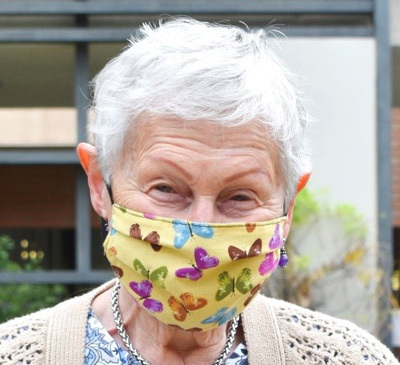Eyes Can Smile


Eyes Can Smile
Until recently, I never fully appreciated how eyes can smile. I knew that eyes could see. I even knew that eyes could connect, as when two people really pay attention to one another. Over this past year, eyes over masks that conveyed sadness and longing had been heavy for our hearts to bear. We all know this—we have been in it together.
So you can imagine how exhilarating it has been, over these past few weeks, to witness smiling eyes. Family visitors smile with their eyes, staff smile with their eyes, and most importantly, our residents are smiling again, even if with their eyes. "Open my eyes that I may perceive the wonders of Your teaching," says the Psalmist (119:18).
Learning in person, not only in some schools, but also here at the Home has resumed. Recently, I was teaching a class about Jewish views on justice. A resident became so excited as she shared her opinions and ideas that she started to pull down her mask. For a split second, I saw that she was wearing lipstick! Even though she wears a mask and we cannot typically see her smiling mouth, she could see her own lips. I reassured her, "You can keep your mask on. I can hear you with my ears and by looking at your eyes."

Coming soon is the Jewish holiday of Shavuot, the holiday when we stand again at Mount Sinai, as it were, and joyfully accept the Torah and Ten Commandments as our ancestors did originally. In light of the upcoming holiday I want to share with you what I have seen and what I see now at our extraordinary Los Angeles Jewish Home.
Remember at Passover, we used our imaginations to "remember" we were slaves in Egypt? We remembered that bitterness of slavery and the sense of longing to leave those terrible conditions. COVID-19 was a sort of Egypt for our residents, as their normal activities and freedoms were unavailable for their own safety.
After Passover, we count the days to Shavuot. We continue in the realm of imagination. Sure, we were slaves, but now we are free. We have a purpose, to journey towards the promised land. And on that journey we stand together at Mount Sinai, connected with each other and with G-d, to receive the Torah.
The eyes of joy that I see today remind me of the exhilaration of Mount Sinai. It is as if a light that had been a bit dimmed has begun to burn brighter, like the rays of light radiating above the eyes of Moses as he comes down the mountain to present the gift.
Thank you to all of you who have given the gift of visits, support, and love of the Los Angeles Jewish Home. Those smiling eyes are in large part because of you.
Rabbi Karen Bender